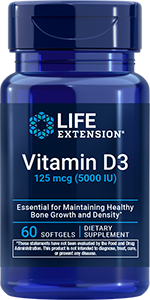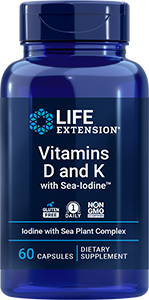
Newsletter
Newsletter
Trials Find Improvements in Sleep and Pain in People Taking Magnesium L-Threonate

Findings from clinical trials revealed benefits for magnesium L-threonate, a form of magnesium with good brain bioavailability, in people with poor sleep and cancer patients treated for pain.1,2
A three-week randomized, double-blind trial found that sleep quality and daytime functioning significantly improved among individuals who received magnesium L-threonate compared with a placebo. Magnesium L-threonate was significantly associated with better deep sleep and rapid eye movement (REM) sleep scores, light sleep time, and activity and readiness tracked by wearable devices. Participants who received magnesium L-threonate reported improvements in behavior after awakening, grouchiness, mood and mental alertness compared with the placebo group. Daily diary entries documented better-perceived energy and daytime productivity. “The results are consistent with the action of magnesium on the brain reported elsewhere and suggest a broader positive impact of magnesium L-threonate beyond simply sleep,” Heather A. Hausenblas and colleagues concluded.
Another randomized, double-blind trial revealed that magnesium L-threonate was better at enhancing the pain-relieving effects of opioid drugs used by cancer patients compared with a placebo. Opioids are used to treat cancer-associated pain; however, tolerance to the drugs weakens their pain-relieving benefit. Trial participants who received magnesium L-threonate were able to reduce the dosage of drugs needed to control pain. Constipation, a common side effect of opioid drug use, significantly decreased after a week among those who were given magnesium L-threonate and remained significantly improved compared with the placebo group until the end of the study. “As far as we know, this is the first randomized controlled clinical trial to study the effects of an oral magnesium compound on opioid analgesia in patients with cancer pain,” authors Siyin Wu and associates announced.
The first trial, which included 76 men and women who reported poor sleep quality, was reported in the December 2024 issue of Sleep Medicine: X. Thirty-eight participants received 1,000 milligrams magnesium L-threonate per day and an equal number received a placebo for three weeks. Sleep quality and daytime mood and activity were assessed weekly using questionnaires, and daily via diaries and wearable sleep and activity trackers.
The second trial, reported in the journal Cancer Medicine, included patients with advanced cancer who were treated with morphine for pain. Forty-two participants received 1.5 grams or 2 grams (according to body weight) of magnesium L-threonate and 42 received a placebo daily for 12 weeks. Participants were permitted to adjust their opioid drug doses according to pain levels.
Products
Apply What You’ve Learned: Insomnia
- Insomnia is a common complaint that affects cognition, mood, immune function and more. Seven to nine hours of sleep each night is important for daily and long-term optimal health.
- Magnesium is an essential mineral that is popular among many individuals to induce and support a good night’s sleep. Magnesium inhibits the NMDA receptor that causes poor sleep when its activation is increased. The mineral also increases the activity of the body’s GABA receptors, thereby supporting sleep and relaxation.3
- Melatonin is a hormone released by the pineal gland in the brain in response to dimming light to induce sleep. Because the body’s melatonin production may not always be optimal for rapid and sound sleep, many individuals use melatonin before bedtime. Melatonin not only supports sound sleep, but has an antioxidant property,4 supports healthy immune function5 and has been used as an adjunctive cancer therapy.6
- Other nonpharmaceutical sleep aids include ashwagandha7 and zinc.8 These options do not have the potential adverse effects of prescription sleep drugs.
References
- Hausenblas HA et al. Sleep Med X. 2024 Aug 17:8:100121.
- Wu S et al. Cancer Med. 2023 Feb;12(4):4343-4351.
- Nielsen FH. Modulation of Sleep by Obesity, Diabetes, Age, and Diet. 2015;291-296.
- Ferlazzo N et al. Antioxidants (Basel). 2020 Nov 5;9(11):1088.
- Cardinali DP et al. Neuroimmunomodulation. 2008;15(4-6):272-8.
- Yi YJ et al. Drug Metab Rev. 2024 Feb;56(1):62-79.
- Cheah KL et al. PLoS One. 2021 Sep 24;16(9):e0257843.
- Cherasse Y et al. Int J Mol Sci. 2017 Nov 5;18(11):2334.
Featured Life Extension Magazine® Article
Banish Bloat and Indigestion
By Gregory E. Bigford, PhD, MSBA
Bloating and indigestion are common complaints that over-the-counter and prescription remedies don’t always relieve. Two plant extract combinations—fennel-curcumin and artichoke-ginger—have been shown to improve common digestive symptoms that impact quality of life.
In one randomized, controlled trial, participants who consumed a combination of fennel and curcumin from turmeric root twice per day for 30 days experienced a 50% average reduction in irritable bowel syndrome symptoms that included abdominal pain and bloating. This improvement in symptoms was nearly twice that reported by a placebo group. In another trial, twice daily ginger root and artichoke extracts reduced digestive complaints after four weeks among 63% of participants who received it, compared with 25% of a placebo group.
Read Full Article
What's Hot
Health Concern
How Diet May Help Protect Against Effects of Insufficient Sleep
In an interview with Harvard Medicine News published April 11, 2023, neurobiologist Dragana Rogulja discussed her findings in the understanding of sleep, including a protective role for antioxidants against the effects of sleep deprivation.

Insomnia
Most people should target getting seven to nine hours of sleep per night. It’s estimated however that a third of American adults don’t get the recommended amount of sleep.
Related Life Extension Magazine® Articles

Improve Sleep Efficiency and Duration
Clinical studies show that two plant extracts promote restful sleep. One improved sleep efficiency by 74% while the other enhanced restorative sleep by 72%.

How Magnesium Helps Reverse Brain Aging
Scientists at MIT show how a form of magnesium reversed measures of brain aging by nine years in people.
Highlight
Join Dr. Mike and Dr. Crystal as they sit down with some of today’s leading medical, health, and wellness experts to discuss a variety of health-related topics.
Learn MoreLife Extension Magazine® Issue Now Online
A remarkable number of healthy-longevity findings have been published over the past 18 months.




